There are a lot of exhausted writers out there.
We all need between 7-8 hours of sleep per night for good health.
Less than that has been linked to an increased risk of obesity, diabetes, cancer, heart disease, and even early death.
Writers are creative folks, and need their sleep to keep their brains sharp. A 2010 study found that sleep, especially deep REM sleep, improved memory and creativity.
Earlier research demonstrated that getting a good night’s sleep vastly improved participants’ abilities to make unusual or remote connections—a skill that is key to creativity.
And we all know how “sleeping on it” can help us wake up with solutions to our plot problems.
It’s not always easy to fall asleep, though, especially if you’re in the middle of a book launch or behind on your next deadline. Sleeping pills, while convenient, are not the right answer.
A study of over 10,000 people found that those who had prescriptions for sleeping pills were four times as likely to have died during the 2.5-year follow-up as those who didn’t take the drugs.
Results also showed that those taking sleeping pills were at a 35 percent increased risk of cancer compared to those not taking them.
If you’re having trouble sleeping, don’t risk the side effects or serious health risks of sleeping pills. Try one or more of these options instead.
 1. Drink a cup of tea before bed.
1. Drink a cup of tea before bed.
Hot tea is a soothing, calming drink, and there are many herbal types that have shown in studies to help people relax and fall asleep more easily. Some like skullcap, lemon balm, and chamomile help to ease muscle tension as well as calm you down so sleep comes more easily.
Passionflower is regularly used as a home remedy for insomnia, and we have some evidence that valerian can help you feel drowsy without the side effects of sleeping pills. Other good options include ginger, lavender, and plain green tea.
 Exhausted Writers Tip 2. Keep a small notebook nearby.
Exhausted Writers Tip 2. Keep a small notebook nearby.
Writers are wise to keep a small paper notebook by their beds for jotting down those ideas that pop into our heads either right before we go to sleep or in the middle of the night.
Don’t use your smartphone or tablet—keep these out of the bedroom as their light messes with your sleep hormones and disrupts deep REM sleep. Use plain paper and a pencil instead and a small flashlight if needed. Jot down the idea and then leave it for the morning.
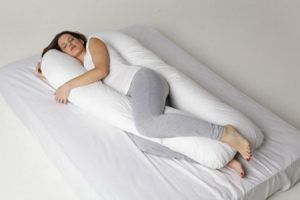 3. Use a body pillow.
3. Use a body pillow.
Particularly if you’re a side sleeper—or if you suffer from back, shoulder, and neck pain—a body pillow can be a lifesaver when it comes to getting your recommended 7-8 hours a night.
Side sleepers often experience excess stress on the spine because the top leg pulls on the back muscles throughout the night. The same kind of strain from the top arm can also create shoulder pain. The bottom shoulder also collapses, putting strain on the neck.
The resulting pain may cause you discomfort during the day, and may also make for restless, sleepless nights.
A body pillow placed between the arms and knees helps relieve this type of spinal strain, and also allows your muscles to relax more completely because you have the extra support under your upper arm and leg. The pillow brings your body into better alignment, promoting a more restful sleep.
The action of “hugging” the pillow creates other benefits, too, encouraging a comfy, cozy feeling that helps you relax and more easily drift off to sleep.
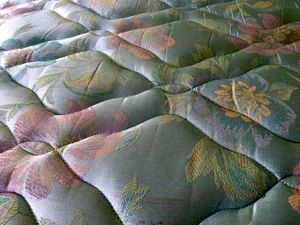 Exhausted Writers Tip 4. Get a GOOD mattress.
Exhausted Writers Tip 4. Get a GOOD mattress.
Many of us fall victim to the sale prices when purchasing a mattress, but this is a huge mistake.
If you don’t have a quality, supportive mattress, it’s going to be difficult for you to sleep well no matter what else you do.
We have scientific evidence for it. In a 2009 study, researchers asked about 60 participants who were having trouble sleeping to take 28 days to record how they felt sleeping on their own beds, and then 28 days recording how they felt sleeping on new, medium-firm beds.
Results showed that participants experienced more restful and pain-free sleep on the newer beds and also experienced reduced stress levels. The researchers concluded that “new beddings systems increased sleep quality and reduced back discomfort….”
Signs You Need a New Mattress
When you think about it, we spend about a third of our lives in bed. Make that quality time with a mattress that helps, not hurts, your sleep. Mattresses last between 5-10 years, and after that it’s definitely time to replace them. Signs that your mattress has had it include:
- Lumps, dips, and “hills” that you feel while sleeping on them
- Sags in particular spots that don’t go away when you turn the mattress over
- Thin top layer so that you feel the innersprings
- Overall sagginess—the bed no longer firmly supports your back
- Pain upon waking or in the middle of the night
Unfortunately, it’s not always easy to choose a new mattress. According to a 2011 study, when allowed to choose a mattress in a showroom full of them, people weren’t likely to choose the ones that maximized sleep quality.
“When allowed to test mattresses in a typical showroom experience,” researchers said, “individuals appear to choose mattresses that do not optimize their sleep.”
How to Pick the Right Mattress
So how can you increase your odds that you’ll pick the right mattress?
First, make sure that the store gives you at least 30 days to try it out. If it doesn’t work better than your old one, send it back and try again. Studies show that “optimal firmness” varies depending on the individual, so you really have to find out if the mattress is best for you.
Next, pass by the cheap models. They may feel fine in the store, but they break down more quickly than quality mattresses, and you’ll be back to experiencing the same sleep problems within 3-6 months.
You don’t have to choose the most high-dollar one either—many mattresses in the mid-range are just as good. Beware, too, of firm and extra-firm mattresses—they aren’t always best for back pain. You need something that supports you, but that doesn’t create pressure points on your muscles or bones.
While you’re looking around in the store, if you find a mattress you like, spend at least 20 minutes resting on it. A quick minute or two isn’t enough. Pay special attention to how your spine feels, and how your shoulders feel. You can bring along a friend or partner who can observe you and let you know if there are any gaps between your spine and the mattress.
The important thing is to take your time. Finding the right mattress usually requires quite a bit of shopping at various locations, and lots of testing. Don’t rush the process and don’t let the salespeople lead you one way or the other.
For more information on different mattress types, try this article on Good Housekeeping.
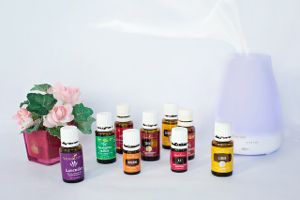 5. Get an aromatherapy diffuser.
5. Get an aromatherapy diffuser.
Our noses can lead us off into la la land if we give them a little help. In a recent 2017 study, researchers found that when patients in an intensive care unit inhaled lavender essential oil, they slept better and also experienced reduced anxiety.
The American Pharmacist’s Association agrees that lavender may help people fall asleep, and note several small studies where the scent of lavender improved sleep quality. It may not work for everyone, but it’s such an easy thing to try that if you’re struggling to get to sleep, you’ve got nothing to lose in experimenting a bit.
You can try putting several drops of lavender essential oil in your bath before bed, or put a few drops in an aromatherapy diffuser. Some diffusers use water, which can also humidify your bedroom for additional comfort. Other essential oils connected with good sleep include vanilla, sandalwood, bergamot, and ylang ylang.
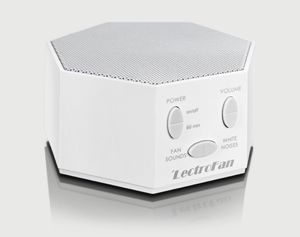 Exhausted Writers Tip 6. Try a white noise machine.
Exhausted Writers Tip 6. Try a white noise machine.
You may be awakened in the middle of the night by noise in the household or in your neighborhood, but even if you’re not, a white noise machine may help you sleep.
White noise is defined as “a consistent noise that comes out evenly across all hearable frequencies,” according to Popular Science. It’s said to create a masking effect on all other noises, keeping a steady sound that goes on all night long. Like elevator music, it’s a sound that is even and unchanging and doesn’t arouse any emotion.
When some sound wakes you up in the middle of the night, it’s usually because it’s a “different” sound than what you’ve been hearing prior to that. It’s the change that startles you. White noise masks any change and keeps a steady stream of soothing sounds going at your ears so you aren’t disturbed.
The idea doesn’t work for everyone—some people actually become more sensitive to other sounds when there’s white noise going on—but in some folks it’s really effective. It’s why many parents put a fan in the baby’s room, for example—the soothing, constant sound provides a steady and safe-feeling atmosphere in which to sleep.
You can use a fan, too, or a sound machine that produces soothing rainstorm or ocean sounds. Or you can Google “white noise machines” and take your pick.
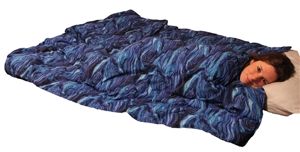 7. Try a weighted blanket.
7. Try a weighted blanket.
If you’re suffering from anxiety and stress, a weighted blanket may be what you need.
Weighted blankets have compartments that are filled with poly plastic pellets that provide extra weight. The blanket usually weighs about 10 percent of the person’s body weight, and when used, provides a sort of “warm hug” feeling that helps release the brain’s good mood neurotransmitters serotonin, while easing anxiety.
The blankets also provide a bit of pressure stimulation that helps relax the body and create a secure feeling. Studies have found these blankets to be helpful for people with insomnia, anxiety, autism, ADHD, restless leg syndrome, and more.
In a 2015 study, for example, researchers found that the weighted blanket had a positive impact on sleep, helping users to experience a calmer night’s sleep with less restless movement. The users also reported feeling more comfortable and secure.
Try the Mosaic or Peaceful Product weighted blankets, or check on Amazon for other options. If you’re handy with a needle, you can even make your own. Find instructions at CraftNectar.com or Mommy Sews.
Do you have other tools you use to help you get to sleep? Please share them with our readers!
Sources
Ackerley, R., Badre, G., & Olausson, H. (2015). Positive Effects of a Weighted Blanket on Insomnia. Journal of Sleep Medicine and Disorders, 2(3). Retrieved from https://www.jscimedcentral.com/SleepMedicine/sleepmedicine-2-1022.pdf
American Pharmacists’ Association. (2014, May 1). Lavender aromatherapy as sleep aid | American Pharmacists Association. Retrieved from https://www.pharmacist.com/lavender-aromatherapy-sleep-aid
Hogan, S., Edinger, J., Bieler, G., & Krystal, A. (2011). Choosing the Best Mattress: An Experiment in Testing Whether Individuals Choose a Bed that Leads to Improved Sleep. Retrieved from http://www.rti.org/sites/default/files/resources/rr-0016-1108-hogan.pdf
Jacobson, B. H., Boolani, A., & Smith, D. B. (2009). Changes in back pain, sleep quality, and perceived stress after introduction of new bedding systems. Journal of Chiropractic Medicine, 8(1), 1-8. Retrieved from https://www.ncbi.nlm.nih.gov/pmc/articles/PMC2697581/
Karadag, E., Samancioglu, S., Ozden, D., & Bakir, E. (2015). Effects of aromatherapy on sleep quality and anxiety of patients. Nursing in Critical Care, 22(2), 105-112. Retrieved from https://www.ncbi.nlm.nih.gov/pubmed/26211735
Kaufman, R. (2010, August 17). Dreams Make You Smarter, More Creative, Studies Suggest. Retrieved from http://news.nationalgeographic.com/news/2010/08/100813-sleep-dreams-smarter-health-science-naps-napping-rem/
Lecher, C. (2014, February 17). White Noise Machine | Popular Science. Retrieved from http://www.popsci.com/article/science/fyi-why-does-white-noise-help-people-sleep
Roberts, A. (2014, September 22). Mattress Buying Guide – How to Choose a Mattress. Retrieved from http://www.goodhousekeeping.com/home-products/a25695/mattress-buying-guide/
Stafford, T. (2013, December 5). BBC – Future – How sleep makes your mind more creative. Retrieved from http://www.bbc.com/future/story/20131205-how-sleep-makes-you-more-creative
What’s the Best Bed?. (2013, August 13). A New Mattress May Improve Sleep Quality and Reduce Stress – What’s The Best Bed. Retrieved from http://www.whatsthebestbed.org/a-new-mattress-may-improve-sleep-quality-and-reduce-stress/


Getting a cup of coffee 😛 I do it daily. I love it, although I sleep for 4-5 hours only, which I know is not good, so will try to sleep for at-least 7 hours.
How about a good shot of Melaleuca Oil in the diffuser ?!
Ha ha ha. It works for everything, right? ;o)
What great tips, Colleen! I don’t have trouble falling asleep, but oh, yes, wake up often with my characters running through my mind. I am really tweaked by the body pillow! Going to check into that!
If you get one let me know what you think!